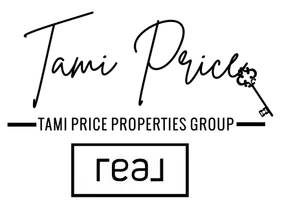Understanding San Antonio Property Taxes and the Homestead Exemption

Owning a home in San Antonio comes with benefits—and one of the most important responsibilities is understanding how property taxes work.
Texas does not have a state income tax, which means local property taxes help fund essential community services like schools, roads, and emergency response.
For homeowners, knowing how these taxes are calculated and how to claim available exemptions can lead to meaningful annual savings.
With nearly two decades of experience guiding buyers and sellers, Tami Price, REALTOR®, helps clients make informed decisions about their homes, including understanding their tax obligations and benefits.
How Property Taxes Work in San Antonio
San Antonio’s property taxes are determined at the county level, primarily through the Bexar Appraisal District (BAD), which assigns a market value to every home annually.
Your total property tax bill is based on:
- Appraised value of your home.
- Tax rates set by local entities such as the county, city, and school district.
- Applicable exemptions that reduce taxable value.
Formula:
(Appraised Value – Exemptions) × Tax Rate = Total Annual Property Taxes

Average Property Tax Rates in 2025
In 2025, property tax rates in Bexar County average between 2.3% and 2.7% of a home’s appraised value, depending on location and school district.
Example:
A home valued at $350,000 with a combined rate of 2.5% would owe about $8,750 per year before exemptions.
Communities within Northside ISD, Judson ISD, and North East ISD may have slightly different rates due to varying district budgets and bond programs.
What Is the Texas Homestead Exemption?
The Homestead Exemption is a key benefit available to Texas homeowners. It reduces the taxable value of your primary residence, helping lower your annual property tax bill.
Key advantages:
- Protects your home’s value from certain creditors.
- Lowers the amount of property taxes you pay each year.
- Caps how much your home’s taxable value can increase annually (typically 10% or less).
This exemption applies only to primary residences, not rental or investment properties.
How Much Can You Save?
As of 2025, Texas law allows for the following:
- General Homestead Exemption: $100,000 reduction from the appraised value for school district taxes.
- Over-65 or Disabled Homeowners: Additional exemptions that further reduce taxable value.
- Local Exemptions: Some cities, counties, and special districts offer extra savings.
These savings can vary but often total hundreds or even thousands of dollars per year depending on location and property value.
How to Apply for the Homestead Exemption
Applying is simple, but it’s critical to do it correctly and only once.
Steps to Apply:
- Visit the Bexar Appraisal District (BAD) website at bcad.org.
- Download or complete the Homestead Exemption application online.
- Submit proof of ownership and your Texas driver’s license or state ID showing the same property address.
- File by April 30 for the current tax year.
Once approved, the exemption renews automatically each year as long as the property remains your primary residence.

Other Common Property Tax Exemptions
Beyond the Homestead Exemption, Texas offers several others for qualifying homeowners:
- Over-65 Exemption: Provides additional savings and freezes school district tax amounts.
- Disabled Veteran Exemption: Reduces or eliminates property taxes based on VA disability rating.
- Surviving Spouse Exemption: Applies to certain surviving spouses of veterans or first responders.
Tami Price, REALTOR®, advises homeowners—especially military families relocating to San Antonio—to explore all applicable exemptions to maximize savings.
When Property Values Rise
San Antonio’s growing population and new development activity continue to influence property values.
If you believe your appraised value is inaccurate, you have the right to protest your property valuation through the Bexar Appraisal District.
Tips for a successful protest:
- Review comparable sales in your neighborhood.
- Gather documentation for repairs or deferred maintenance.
- File your protest before the annual deadline, typically mid-May.

How Property Taxes Affect Buyers and Sellers
For Buyers:
Understanding projected property taxes helps with budgeting and mortgage qualification. Taxes are typically included in escrow payments and can significantly affect monthly costs.
For Sellers:
Providing buyers with accurate tax information improves listing transparency and builds confidence during negotiations.
Tami Price ensures all property tax data is verified and presented clearly on listings and seller disclosures.
Local Insight From a Trusted Expert
Navigating property taxes can feel complex, but a clear understanding of the process helps homeowners make informed financial choices.
As a long-time San Antonio REALTOR®, Tami Price helps clients interpret appraisals, identify eligible exemptions, and coordinate with title and lender professionals to ensure accurate closing statements.
The Bottom Line
Owning a home in San Antonio brings both pride and responsibility. By understanding how property taxes work—and taking advantage of the Homestead Exemption—you can protect your investment, reduce costs, and build long-term equity.

For guidance on how taxes may affect your purchase, sale, or relocation, contact Tami Price, Realtor.
Categories
- All Blogs
- AI and Real Estate Tools
- Alamo Heights
- Amenities in Helotes, Texas
- Best Neighborhoods to Live in Cibolo, TX
- Best Neighborhoods to Live in San Antonio
- Best Places to Live in Leon Valley: A Neighborhood Guide
- Best Places to Live in Northeast Inner Loop: A Neighborhood Guide
- Buyer
- Buyer Education
- Buying a Foreclosed Home in San Antonio
- Castroville, TX
- Cibolo TX
- Client Testimonial
- Clients review
- Commercial & Retail Development
- Cons of Living in Helotes, TX
- Converse TX
- Cost of Living in San Antonio TX
- Downtown Revitalization
- Economic Growth & Industry
Recent Posts






